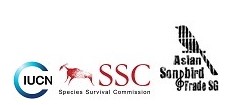The IUCN SSC Asian Songbird Trade Specialist Group (ASTSG) published a brief report
outlining its work scope and achievements since its inception in 2017 and future plans for the tackling of the Asian Songbird Crisis. The report provides updates on the songbird conservation efforts led by the ASTSG’s members between 2017 and 2020, under the group’s five main themes.
Field-based surveys conducted informed the ASTSG’s priority conservation actions and identified further research areas. The findings also contributed to the changes in several species conservation statuses. Among them are Straw-headed Bulbul (Pycnonotus zeylanicus), Sumatran Laughingthrush (Garrulax bicolor), Rufous-fronted Laughingthrush (Garrulax rufifrons) and Javan Pied Starling (Gracupica jalla).
Genetic research helped to identify new genomically distinctive populations of songbirds affected by the trade, notably Javan Jungle Flycatcher (Cyornis banyumas), Simeulue Hill Myna (Gracula religiosa miotera), Sangkar White-eye (Zosterops melanurus), Javan Pied Starling (Gracupica jalla) and three sub-species of Black-winged Myna (Acridotheres melanopterus). A number of internationally renowned zoos and local breeding centres contributed to the establishment of ex-situ populations for songbirds threatened by the trade. Currently, several facilities in Southeast Asia are running conservation breeding programmes for the ASTSG’s priority species, including Greater Green Leafbird (Chloropsis sonnerati), Straw-headed Bulbul (Pycnonotus zeylanicus), Maratua Shama (Kittacincla (malabarica) barbouri), Barusan Shama (Kittacincla (malabarica) melanurus), Javan Pied Starling (Gracupica jalla), Wangi-Wangi White-eye (Zosterops sp. nov.), Javan Green Magpie (Cissa thalassina).
The ASTSG’s trade and legislation team conducted multiple market surveys, including online, and analysed seizure data. Although much of the work focused on the trade in Indonesia, trade in other countries and international trade were also researched, including China, Malaysia, Thailand, Viet Nam and others. The findings supported legislative and law enforcement actions against those smuggling and selling songbirds without permits.
Demand reduction and consumer behaviour change studies were conducted in Indonesia, Singapore and Viet Nam, forming the basis of future behaviour change interventions. Demand reduction, education and community engagement initiatives were launched at different scales by organisations ranging from European zoos to local NGOs.
David Jeggo, Chair of the ASTSG and the report’s co-author, believes that “This long-awaited report will be useful for academics and conservationists researching and tackling the unsustainable songbird trade in Southeast Asia, as well as for other stakeholders involved in the trade.” The report also briefly outlines the direction and plans for the group in upcoming years.
Read the full report here
For more ASTSG news visit www.asiansongbirdtradesg.com/news
